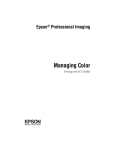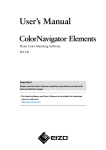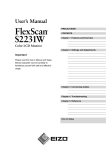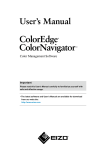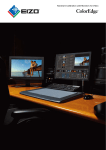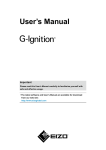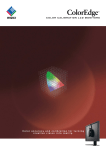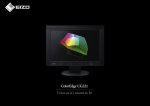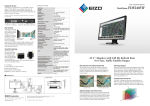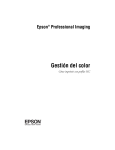Download ColorEdge series brochure (2012, 10)
Transcript
Color Management Monitors ColorEdge - The Ideal Monitors for Expressing Your Creativity Vivid color at all stages of your digital workflow. Design and Publishing 2 Smooth tonal display and accurate color reproduction enhance the quality of your work. Stable image display and dedicated features complement your creativity. Digital Photography Video Editing and Post Production 3 Color Management Begins with the Monitor With ColorEdge, you can implement color management in every process of the workflow. The intricate task of color matching will not take up all your time and effort and color will be faithfully reproduced in your finished work. Digital Photography Design Publishing Another Designer's Monitor Printer Comp from Digital Color Printer Check Data Retouch Final Print Design Make Plates Large Format Inkjet Printer's Output Photo Studio Monitor Monitor Profile Retouching Agency's Monitor Digital Photography Monitor Profile Designer's Monitor Monitor Profile Digital Device Emulation Another Designer's Monitor Prepress Monitor Web Site Monitor Profile Video Editing and Post Production Print Ad Reference Monitor Retouch Inkjet Print Emulate Device Display 3D CG, Animation, Cinema Color Profile E-Contents Edit TV Commercial Monitor Monitor Profile Color Print Monitor Monitor Profile Digital Device Master Monitor 4 Color Profile Editing Monitor Color Profile Film 5 A monitor for all creators from entry level to professional 27" 6 24.1" 27" 24.1" 23" Professional Level Standard Level Entry Level For professionals in photography, retouching, prepress, and post production who want the best in color accuracy. For professionals and prosumers in design, photography, and other creative fields. For hobbyists that want to create, edit, and enjoy digital photography, digital art, and more. ・Built-in calibration sensor ・ColorNavigator calibration software and monitor hood included ・Wide color gamut ・Built-in correction sensor ・ColorNavigator calibration software and monitor hood optional ・Wide color gamut ・Built-in correction sensor ・ColorNavigator calibration software and monitor hood optional ・sRGB color gamut 7 Stable Image Display Free from Environmental Influence Predictable Color You Can Depend on EIZO-Developed ASIC at the Core Individually Adjusted at the Factory All ColorEdge models come with an ASIC (application specific integrated circuit) developed by EIZO to meet the needs of the graphics market. The ASIC has its own algorithms used in high-precision color processing to produce smooth color tones. The gamma level for each ColorEdge monitor is adjusted at the factory. This is accomplished by measuring the R, G, and B gamma values from 0 – 255, then using the monitor’s 16-bit look-up table (LUT) to select the 256 most appropriate tones to achieve the desired value. Smooth Gradation Tonality Breakup ColorEdge Other Monitors Target values in 7 minutes Brightness Chromaticity(Delta y) Ideal Gamma Curve Ideal Gamma Curve Uncorrected Gamma Curve Brightness Target Brightness Chromaticity(Delta x) Chromaticity From the time it is turned on it typically takes 30 minutes or longer for a monitor’s brightness, chromaticity, and tone characteristics to stabilize. EIZO has shortened this warm-up time by more than 75% to a mere 7 minutes. For confirming your work in a photo studio or taking your monitor with you on location, you can get to work right away. Screen Stability Brightness Color That’s Ready When You Are Color Seepage 256 Tones 256 Tones Minutes sRGB Color Space (image) Wide Color Gamut Stable Brightness An EIZO-patented sensor detects changes in the backlight that cause the monitor's brightness to decline over time and compensate for them. This not only stabilizes the brightness, but also minimizes changes in the color temperature that occur when brightness changes. Another sensor is included that detects changes in the ambient temperature and prevents fluctuations to the chromaticity and gamma. Temperature-Induced Changes in Chromaticity Cool Ambient Temperature Warm Chromaticity remains stable with ColorEdge A wide color gamut reproduces almost the entire Adobe RGB color space* so images shot in RAW can be converted to Adobe RGB or images shot in Adobe RGB will be displayed correctly. The colors seen in photos of vibrant blue skies and lush green forests will be reproduced faithfully in a way that cannot be on monitors with an sRGB color space. The wide color gamut also ensures that the monitors reproduce almost the entire ISOcoated and US web-coated CMYK color spaces used in printing. Adobe RGB Color Space (image) *Not applicable to the CS230. Chromaticity fluctuates with other monitors Wide Viewing Angles with IPS Panels Brightness and Color Uniformity Screen Uniformity and Color Temperature Changes Without DUE ColorEdge* 4000 K Fluctuations in brightness and chromaticity on different parts of the screen are a common trait of LCD monitors. To counteract this, ColorEdge monitors EIZO’s patented digital uniformity equalizer (DUE) technology to ensure a Delta-E difference of 3 or less across the screen for CG and CX models when they leave the factory. And now DUE also counterbalances the influences that a fluctuating ambient temperature may have on color temperature and brightness to ensure stable image display. 6500 K with DUE *The CS230 uses simpler DUE circuitry than is illustrated here. 8 The 178° viewing angles afforded by the IPS panel technology allows two or more people to view the screen at once with little change in color or contrast. 10-Bit Simultaneous Display Using the DisplayPort input, the monitors offer 10-bit simultaneous color display* from a 16-bit look-up table which means they can show more than one billion colors simultaneously. This is 64 times more colors than you get with 8-bit display which results in even smoother color gradations and reduced Delta-E between two adjacent colors. *A graphics board and software which support 10-bit output are also necessary for 10-bit display. 10-bit display is only available through the DisplayPort input. 8-Bit and 10-Bit Image Display Input Internal processing Output Typical Monitor 8-bit display 8-bit LUT ColorEdge 8-bit display 16-bit LUT ColorEdge 16-bit LUT 16-bit LUT 10-bit display 16-bit LUT 9 Simple and Precise Calibration with ColorNavigator Software EIZO's ColorNavigator software makes calibration both simple and quick. Just input target values for brightness, white point, and gamma. ColorNavigator directly utilizes the monitor's look-up table and creates an ICC profile within minutes. ColorNavigator is bundled with the CG series and optional for the CX and CS series. ColorNavigator Basic Functions ColorNavigator Advanced Functions Calibrate to Preset or User-Assigned Values See How Other Devices Display Color with Media Emulation Calibrate to the White of Your Paper or Brightness of Your Light Box ColorNavigator* emulates the color characteristics of other media devices such as tablets, smart phones, notebook PCs, and other LCD/CRT monitors . With a spectrophotometer, ColorNavigator reads the emulated device's color patches as they appear in a web browser and creates an ICC profile. By using this profile with a ColorEdge monitor, content creators see how their customers view color on their respective devices. *Media emulation is available with ColorEdge CG monitors only. By measuring the white of the paper to be used for printing with an external sensor, ColorNavigator automatically sets the target values for brightness and white point accordingly. You can also measure your light box's* brightness and set it as the target value for calibration to ensure uniform brightness between your monitor and light box when color proofing. Preset values for web contents, photography, and printing are available. Just select one, click "Adjust", and ColorNavigator will begin calibrating. This takes the guesswork out of assigning values for users with limited color management knowledge. Experienced users can assign the desired values for brightness, white point, and gamma and then calibrate. Switch Your Profiles as Needed Change the target profile even when ColorNavigator is not activated. A list of profiles are always instantly accessible. Choose one and it will be applied to your monitor's settings. Post-Calibration Color Adjustment Recalibration Reminder If you need to further fine-tune your color after calibrating, ColorNavigator lets you adjust hue and saturation for all six primary and secondary colors (R,G,B,C,M,Y) as well as white point, brightness, black level and gamma. A monitor needs to be recalibrated at regular intervals to maintain color accuracy. ColorNavigator includes a recalibration reminder that will appear after a certain number of userdetermined hours. You can also be reminded without starting up ColorNavigator by an LED on the monitor's front panel that lights up. Manual adjustment screen Adjustment Color deviation Readjustment *Currently supports JUST Color Communicator 1 and 2 only. Import / Export Adjustment Targets Profile Validation Import and export your post-adjustment target profiles and share the same target values in multiple usage environments. To verify calibration results or check to see how much the monitor's colors have varied since it was last calibrated, ColorNavigator measures the monitor's color patches to determine the difference between the Delta-E value of the monitor's profile and the actual displayed values of the monitor. CG series validates RGB and CMYK values. CX and CS series validate RGB values only. Export Import Color Matching with Other Monitors ColorNavigator factors for the different characteristics between ColorEdge monitors and calibration devices to provide accurate results. Calibrate Your Monitor to Another Profile If you want to conduct color management between monitors in a workflow ColorNavigator lets you load the profile of another ColorEdge monitor and use it to calibrate your own. Matching between different ColorEdge monitors 10 11 Built-In Sensors to Automate Your Workflow Comfort and Convenience Built-In Calibration Sensor Multiple Inputs Automate your calibration with the sensor that is housed within the monitor's front bezel and swings up onto the screen only when calibrating. This sensor eliminates the need for a thirdparty calibration device and even operates in portrait mode. DisplayPort, HDMI, and DVI inputs are included for connecting to various types of graphics boards, The HDMI input also offers direct connection with digital cameras. Two USB upstream ports allow two computers to be connected at once so it’s not necessary to reconnect the USB cable when using the ColorNavigator software and switching between the two computers. Available with the CG series only. Input Terminals of CG246, CX240, and CS230 DVI-I 29-pin connector HDMI DisplayPort USB upstream x2 USB downstream x2 SelfCalibration sensor built into the CG276 and CG246 Scheduled Self Calibration Ample Screen Sizes for Creative Work Using either the OSD menu or the bundled ColorNavigator software, you can schedule the monitor to self-calibrate at specific times. Even if the monitor is switched off or not connected to a computer, it will stick to its preset schedule and self-calibrate. The CG246 and CX240 display two A4 pages plus tool palettes on their 24.1-inch screens. The CG276 and CX270 give you even more room to work with their spacious 27-inch screens and 2560 x 1440 resolution. Correlation with External Sensors Adjustable Stand CG series monitors can be correlated to the measurement results of an external calibration sensor. After correlating, the built-in sensor will automatically recalibrate to the settings. This is convenient if the monitor is used in a work environment with other monitors and one measurement device must be used as a standard for all calibration. Adjust the screen to the most comfortable angle and reposition it to show your work to a colleague or client. The monitor comes with a versatile stand that offers height, tilt, and swivel adjustments as well as portrait mode display. Height Adjustment Tilt Portrait Mode Swivel Vertical 128 mm (CG246/CX240) Correlation to ColorMunki results Built-In Correction Sensor With the CX and CS series, a third-party sensor is required for calibrating the monitor, but the monitor’s built-in correction sensor maintains the calibration settings. The correction sensor is housed within the monitor's upper bezel and appears only after a specific amount of time determined by the user has elapsed. Even if the monitor is switched off or not connected to a computer, it will stick to its preset schedule and self correct. Shading Hood for Portrait and Landscape Modes Automatic self correction Most shading hoods can only be used in landscape mode, but the CG series comes with a unique hood that is designed for portrait mode as well. Now you can keep the glare off your screen no matter which mode you work in. Shading hoods are optional with the CX and CS series. Color Blindness Simulation Records white point and brightness of external sensor when calibrating 12 Available on www.eizo.com, UniColor Pro software simulates color blindness so designers can see how their color schemes will appear to those with color vision deficiency. 13 Advanced Performance for Video, Too CX and CS Series Gentle on the Eyes A Commitment to Quality and the Environment Excellent Tone Display in the Dark Ambient Brightness Sensor 5-Year Warranty When viewing the screen from an angle in a dimly lit room, dark tones typically appear washed out due to the display characteristics of LCD backlights. The CG246 and CX240 maintain a high contrast ratio even from an angle which allows the dark tones to retain their depth. A sensor measures the ambient brightness and adjusts the screen's brightness so it is never too bright or too dark. Prioritize Contrast Ratio The Look of Paper ColorEdge monitors are backed by a manufacturer’s 5-year warranty that covers all components including the LCD panel. EIZO can do this because it manufacturers its products at its own factories. This allows EIZO to keep close control over production quality and ensure that its monitors are built to last for 5 years. For dark environments such as a video editing studio, you can prioritize a high contrast ratio brightness over screen brightness uniformity by pressing a button on the front of the monitor. CG246 Conventional Monitor A preset called Paper mode simulates the look of printed paper and helps prevent eyestrain when reading documents. 1080/24p Playback Film is usually shot at 24 frames/second and looks unnatural when played back on a typical monitor that displays 60 frames/second. The CG series supports a video signal display rate of 24 frames/second so you can edit the film as it was meant to be viewed. Pixel Defect Warranty up to 12 Months Range Extension For the CG series, the RGB full pixel failure is zero for up to 12 months after date of purchase based on ISO 9241-307 (pixel failure class I). All ColorEdge models give studio professionals the advantage of using the monitor's entire 10-bit grayscale range to see more detail when doing fine editing work in very dark and very light tones. Setting the screen to show the entire 10-bit grayscale range reveals either 6% or 14% more gray tones from 0 (true black) to 1023 (true white) compared to common broadcast signal display range capabilities. LED Buttons and On-Screen Button Guide For dimly lit work environments like post production studios, the CG series comes with backlit control buttons and an on-screen button guide to indicate what each button is for. Preset Modes for Optimum Viewing Mercury-Free LED Backlight In addition to Paper, several preset modes are included with ideal settings for your creative and other computing tasks. You can switch between modes manually by pushing a button or automatically with the Auto FineContrast function*. The CG246, CX240, and CS230 come with an LED backlight that contains no mercury for minimal environmental impact when eventually disposed of. When a ColorEdge monitor is turned off via the power button on its front bezel it consumes no electricity. 3D LUT for Accurate Color Display A 3D LUT is included with the CG series which adjusts colors individually on an RGB cubic table. With the bundled ColorNavigator software’s emulation function, the 3D LUT applies a film look to the image so creators can check how it will be seen by their audience. The 3D LUT also improves the monitor's additive color mixture (combination of RGB), which is a key factor in its ability to display neutral gray tones. Zero Watts When Turned Off Modes changes automatically with each application Preset Color Modes A button on CG series monitors provides quick access to several broadcast-standard color modes: Rec. 709, EBU, SMPTE-C, and DCI. In addition, sRGB and Adobe RGB modes are also available with the CX series. Safe Area Marker A safe area marker included with the CG series designates the area of the screen that will be displayed when the monitor is connected to a particular device. This allows you to check that subtitles and other text will be visible. This color of the marker is changeable to ensure it remains easily visible with any imagery. 14 *Auto FineContrast is included with the ScreenManager Pro for LCD software and available for free on www.eizo.com. Compatible with Windows OS only. Adobe RGB mode not available with CS230. 15 Specifications 27" Model Variation Type Size Native Resolution Display Size (H x V) Pixel Pitch Grayscale Tones Panel Display Colors Viewing Angles (H / V, typical) Brightness (typical) Recommended Brightness for Calibration Contrast Ratio (typical) Response Time (typical) Wide Gamut Coverage (typical) Input Terminals Digital Scanning Frequency (H / V) Video Signals Analog Scanning Frequency (H / V) Function USB Standard Power Requirements Maximum Power Consumption Typical Power Consumption Power Save Mode Standby Mode Power Management Power Self-Calibration Self-Correction Features & Functions Brightness Stabilization Digital Uniformity Equalizer Preset Modes Physical Specifications Environmental Requirements Auto EcoView Dimensions (Landscape, W x H x D) Dimensions (Portrait, W x H x D) Dimensions (Without Stand, W x H x D) Dimensions (Landscape with Hood, W x H x D) Dimensions (Portrait with Hood, W x H x D) Net Weight Net Weight (Without Stand) Net Weight (With Hood) Height Adjustment Range Tilt Swivel Pivot Hole Spacing (VESA Standard) Temperature Humidity (R.H., non condensing) Certifications & Standards (Please contact the EIZO subsidiary or distributor in your country for the latest information.) Supplied Accessories Warranty 24.1" 27" 596.7 x 335.6 mm 0.2331 x 0.2331 mm DisplayPort: 1024 tones from a palette of 65,281 tones DVI, HDMI: 256 tones from a palette of 65,281 tones DisplayPort: 1.07 billion from a palette of 278 trillion DVI, HDMI: 16.77 million from a palette of 278 trillion 178°, 178° 320 cd/m2 120 cd/m2 or less 1000:1 6 ms (Gray-to-gray) Adobe RGB: 97% DVI-D 24 pin (with HDCP), DisplayPort (with HDCP), HDMI (with HDCP) DisplayPort, DVI: 26 - 89 kHz, 23.75 - 63 Hz (VGA Text: 69 - 71 Hz) HDMI: 15 - 68 kHz, 23.75 - 61 Hz 2 ports for monitor control 2 port of USB hubs USB 2.0 AC 100 - 120 V / 200 - 240 V, 50 / 60 Hz 154 W 68 W Less than 0.7 W Less than 0.5 W Power Save (DisplayPort: Rev. 1.1a, DVI: DVI DMPM) Yes Yes Yes Color Mode (User1, User2, User3, Paper, Adobe RGB, sRGB, Calibration) Yes 646 x 425 - 576.5 x 281.5 mm 402 x 671 - 704 x 281.5 mm 646 x 402 x 92 mm 13.6 kg 9.7 kg 151.5 mm 25° Up, 0° Down 344° 90° 100 x 100 mm 0 - 35 °C 20 - 80 % DVI-I 29 pin (with HDCP), DisplayPort (with HDCP), HDMI (with HDCP) DisplayPort, DVI: 26 - 68 kHz, 23.75 - 63 Hz (VGA Text: 69 - 71 Hz) HDMI: 15 - 68 kHz, 23.75 - 61 Hz 26 - 68 kHz, 47.5 - 61 Hz 2 ports for monitor control 2 port of USB hubs USB 2.0 AC 100 - 120 V / 200 - 240 V, 50 / 60 Hz 54 W 21 W Less than 0.5 W Less than 0.5 W Power Save (VESA DPM, DisplayPort Version 1.1a, and DVI DMPM) Yes Yes Yes Color Mode (User1, User2, User3, Paper, sRGB, Calibration) CUDO certified mark, TÜV/S, TÜV/Ergonomics (including ISO 9241-307 [Pixel fault class I]), TÜV/GS, cTUVus, CE, c-Tick, CB, VCCI-B, FCC-B, Canadian ICES-003-B, RoHS, WEEE CUDO certified mark, TCO'03, TÜV/Ergonomics (including ISO 9241-307 [Pixel fault class I]), TÜV/GS, cTÜVus, CE, c-Tick, CB, VCCI-B, FCC-B, Canadian ICES-003-B, RoHS, WEEE CUDO certified mark, TCO Displays 5.2, TÜV/S, TÜV/Ergonomics (including ISO 9241-307 [Pixel fault class I]), TÜV/GS, cTÜVus, CE, c-Tick, CB, VCCI-B, FCC-B, Canadian ICES-003-B, RoHS, WEEE CUDO certified mark, TCO Displays 5.2, TÜV/S, TUV/Ergonomics (including ISO 9241-307 [Pixel fault class I]), TÜV/GS, cTÜVus, CE, c-Tick, CB, VCCI-B, FCC-B, Canadian ICES-003-B, RoHS, WEEE AC power cord, signal cables (DVI-D - DVI-D, Mini DisplayPort DisplayPort), USB cable, setup guide, EIZO LCD Utility Disk (ColorNavigator software, PDF user's manual), adjustment certificate, ScreenCleaner, monitor hood, quick reference, warranty card AC power cord, signal cables (DVI-D - DVI-D [dual link supported], Mini DisplayPort - DisplayPort), USB cable, setup guide, EIZO LCD Utility Disk (PDF user's manual), warranty card AC power cord, signal cables (DVI-D - DVI-D, Mini DisplayPort - DisplayPort), USB cable, setup guide, EIZO LCD Utility Disk (PDF user's manual), warranty card AC power cord, signal cables (DVI-D - DVI-D), USB cable, setup guide, EIZO LCD Utility Disk (PDF user's manual), warranty card Five Years1 Five Years1 Five Years1 596.7 x 335.6 mm 0.2331 x 0.2331 mm DisplayPort: 1024 tones from a palette of 65,281 tones DVI, HDMI: 256 tones from a palette of 65,281 tones DisplayPort: 1.07 billion from a palette of 278 trillion DVI, HDMI: 16.77 million from a palette of 278 trillion 178°, 178° 320 cd/m2 120 cd/m2 or less 1000:1 6 ms (Gray-to-gray) Adobe RGB: 97% DVI-D 24 pin (with HDCP), DisplayPort (with HDCP), HDMI (with HDCP) DisplayPort, DVI: 26 - 89 kHz, 23.75 - 63 Hz (VGA Text: 69 - 71 Hz) HDMI: 15 - 68 kHz, 23.75 - 61 Hz 2 ports for monitor control 2 port of USB hubs USB 2.0 AC 100 - 120 V / 200 - 240 V, 50 / 60 Hz 154 W 73 W Less than 0.7 W Less than 0.5 W Power Save (DisplayPort: Rev. 1.1a, DVI: DVI DMPM) Yes Yes Yes Color Mode (Custom, Adobe RGB, sRGB, Rec709, EBU, SMPTE-C, DCI, Calibration) 646 x 425 - 576.5 x 281.5 mm 402 x 671 - 704 x 281.5 mm 646 x 402 x 92 mm 653 x 432.5 - 584 x 379.5 mm 410.5 x 679 - 712 x 379.5 mm 13.6 kg 9.7 kg 14.7 kg 151.5 mm 25° Up, 0° Down 344° 90° 100 x 100 mm 0 - 35 °C 20 - 80 % CUDO certified mark, TÜV/Ergonomics (including ISO 9241-307 [Pixel fault class I]), TÜV/GS, cTÜVus, CE, c-Tick, CB, VCCI-B, FCC-B, Canadian ICES-003-B, RoHS, WEEE AC power cord, signal cables (DVI-D - DVI-D [dual link supported], Mini DisplayPort - DisplayPort), USB cable, setup guide, EIZO LCD Utility Disk (ColorNavigator software, PDF user's manual), adjustment certificate, ScreenCleaner, monitor hood, quick reference, warranty card Five Years1, 2, 3 23" CX240: Monitor only (ColorNavigator not included) IPS 24.1" / 61 cm (611 mm diagonal) DisplayPort, DVI: 1920 x 1200 (16:10 aspect ratio) HDMI: 1920 x 1080 (16:9 aspect ratio) 518.4 x 324 mm 0.270 x 0.270 mm DisplayPort: 1024 tones from a palette of 65,281 tones DVI, HDMI: 256 tones from a palette of 65,281 tones DisplayPort: 1.07 billion from a palette of 278 trillion DVI, HDMI: 16.77 million from a palette of 278 trillion 178°, 178° 300 cd/m2 120 cd/m2 or less 1000:1 7.7 ms (Gray-to-gray) Adobe RGB: 97% DVI-I 29 pin (with HDCP), DisplayPort (with HDCP), HDMI (with HDCP) DisplayPort, DVI: 26 - 78 kHz, 23.75 - 63 Hz (VGA Text: 69 - 71 Hz) HDMI: 15 - 68 kHz, 23.75 - 61 Hz 26 - 78 kHz, 47.5 - 61 Hz 2 ports for monitor control 2 port of USB hubs USB 2.0 AC 100 - 120 V / 200 - 240 V, 50 / 60 Hz 98 W 38 W Less than 0.5 W Less than 0.5 W Power Save (VESA DPM, DisplayPort Version 1.1a, and DVI DMPM) Yes Yes Yes Color Mode (User1, User2, User3, Paper, Adobe RGB, sRGB, Calibration) Yes 575 x 417 - 545 x 245.5 mm 398 x 594.5 - 642.5 x 245.5 mm 575 x 398 x 75 mm 9.8 kg 7.1 kg 128 mm 30° Up, 0° Down 344° 90° 100 x 100 mm 0 - 35 °C 20 - 80 % IPS 24.1" / 61 cm (611 mm diagonal) DisplayPort, DVI: 1920 x 1200 (16:10 aspect ratio) HDMI: 1920 x 1080 (16:9 aspect ratio) 518.4 x 324 mm 0.270 x 0.270 mm DisplayPort: 1024 tones from a palette of 65,281 tones DVI, HDMI: 256 tones from a palette of 65,281 tones DisplayPort: 1.07 billion from a palette of 278 trillion DVI, HDMI: 16.77 million from a palette of 278 trillion 178°, 178° 300 cd/m2 120 cd/m2 or less 1000:1 7.7 ms (Gray-to-gray) Adobe RGB: 97% DVI-I 29 pin (with HDCP), DisplayPort (with HDCP), HDMI (with HDCP) DisplayPort, DVI: 26 - 78 kHz, 23.75 - 63 Hz (VGA Text: 69 - 71 Hz) HDMI: 15 - 68 kHz, 23.75 - 61 Hz 26 - 78 kHz, 47.5 - 61 Hz 2 ports for monitor control 2 port of USB hubs USB 2.0 AC 100 - 120 V / 200 - 240 V, 50 / 60 Hz 98 W 41 W Less than 0.5 W Less than 0.5 W Power Save (VESA DPM, DisplayPort Version 1.1a, and DVI DMPM) Yes Yes Yes Color Mode (Custom, Adobe RGB, sRGB, Rec709, EBU, SMPTE-C, DCI, Calibration) 575 x 417 - 545 x 245.5 mm 398 x 594.5 - 642.5 x 245.5 mm 575 x 398 x 75 mm 582.5 x 425 - 553 x 369 mm 406 x 602.5 - 650.5 x 369 mm 9.9 kg 7.2 kg 10.7 kg 128 mm 30° Up, 0° Down 344° 90° 100 x 100 mm 0 - 35 °C 20 - 80 % IPS 27" / 68 cm (684 mm diagonal) 2560 x 1440 (16:9 aspect ratio) 24.1" CX270: Monitor only (ColorNavigator not included) IPS 27" / 68 cm (684 mm diagonal) 2560 x 1440 (16:9 aspect ratio) Five Years1, 2, 3 CS230: Monitor only (ColorNavigator not included) IPS 23" / 58 cm (584 mm diagonal) 1920 x 1080 (16:9 aspect ratio) 509.2 x 286.4 mm 0.2652 x 0.2652 mm DisplayPort: 1024 tones from a palette of 65,281 tones DVI, HDMI: 256 tones from a palette of 65,281 tones DisplayPort: 1.07 billion from a palette of 278 trillion DVI, HDMI: 16.77 million from a palette of 278 trillion 178°, 178° 300 cd/m2 120 cd/m2 or less 1000:1 10.5 ms (Gray-to-gray) Yes 544 x 372.5 - 526.5 x 245.5 mm 353 x 563.5 - 627 x 245.5 mm 544 x 353 x 75 mm 7.5 kg 4.8 kg 154 mm 30° Up, 0° Down 344° 90° 100 x 100 mm 0 - 35 °C 20 - 80 % 1 Usage time is limited to 30,000 hours from the date of purchase. Brightness is warranted for up to 10,000 hours from the data of purchase if it is used within the recommended brightness of 120 cd/m2 or less and the color temperature between 5000 – 6500 K. The RGB full pixel failure is zero for up to 12 months after date of purchase based on ISO 9248-307 (pixel failure class I). With current LCD technology, a panel may contain a limited number of missing or flickering pixels. 2 3 Accessories Shading Hoods Monitor Cleaning Kit Calibration Software Supported Models: CG246, CX240 CH7 is bundled with the CG246. Wipe away dust and fingerprints with this screen cleaner kit. Includes pump spray and cloth. Bundled with the CG series. Software for calibrating CX and CS series. A separate license is required for each monitor. Supported Model: CS230 Supported Models: CG276, CX270 CH5 is bundled with the CG276. 16 System Requirements (as of September 2012) See www.eizo.com for the latest information. Compatible Operating System Additional Requirements Compatible Measurement Devices Macintosh Windows OS X 10.4.11 – 10.8 Windows 7 (32-bit、64-bit) / Vista (32-bit、64-bit) /XP (32-bit、64-bit) Apple Macintosh that fulfills the OS system requirements (iMac PowerPC, iBook, iBook G4 are not compatible) PC that fulfills the OS system requirements ・Two or more available USB ports ・Minimum 16.7 million display colors ・Recommended minimum resolution of 1024 x 768 Manufacturers Supported Sensors Notes i1 Monitor / i1 Pro / i1Pro 2 i1Display / i1Display 2 / i1Display 3 / i1Display Pro Ambient light adjustment is not available with the i1 Monitor and i1 Display. ColorMunki PHOTO / ColorMunki DESIGN Monaco OPTIX Series (DTP94, DTP94B) Ambient light adjustment is not available. DataColor Spyder 3, Spyder 4 EIZO EX1, EX2 Built-in calibration sensors Ambient light adjustment and gray balance prioritizing function are not available. Ambient light adjustment and paper white measurement are not available and therefore calibration using such measured values is not available. 17 153 Shimokashiwano, Hakusan, Ishikawa 924-8566 Japan Phone +81-76-277-6792 www.eizo.com Fax: +81-76-277-6793 © 2012 Eizo Nanao Corporation All product names are trademarks or registered trademarks of their respective companies. ColorEdge and EIZO are registered trademarks of Eizo Nanao Corporation. Adobe product screenshots reprinted with permission from Adobe Systems Incorporated. Specifications are subject to change without notice. The terms HDMI and HDMI High-Definition Multimedia Interface, and the HDMI Logo are trademarks or registered trademarks of HDMI Licensing, LLC in the United States and other countries. (120901) Printed in Japan, 9, 2012, 8K












